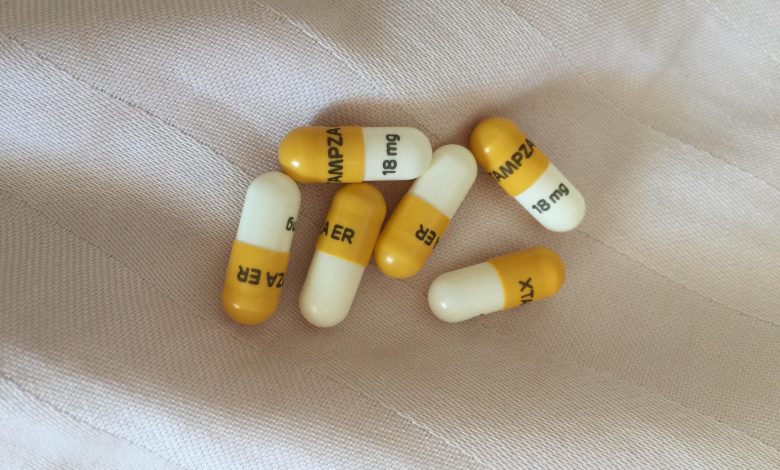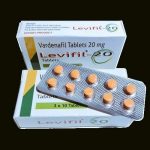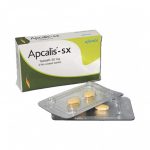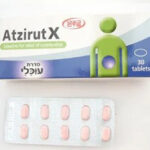Xtampza ER: Uses, Dosage, Side Effects, Interactions, Warnings

Xtampza ER is a brand of oxycodone extended-release capsules. Xtampza ER is in a class of medications called opiate (narcotic) analgesics. It works by changing the way the brain and nervous system respond to pain.
Oxycodone extended-release tablets and extended-release capsules are used to relieve severe pain in people who are expected to need pain medication around the clock for a long time and who cannot be treated with other medications. Xtampza ER should not be used to treat pain that can be controlled by medication that is taken as needed. Xtampza ER should only be used to treat people who are tolerant (used to the effects of the medication) to opioid medications because they have taken this type of medication for at least one week.
Xtampza ER is primarily indicated for the management of pain severe enough to require daily, around-the-clock, long-term opioid treatment and for which alternative treatment options are inadequate.
How should I take Xtampza ER?
Xtampza ER comes as an extended-release capsule to take by mouth. The capsules are usually taken every 12 hours with food; eat the same amount of food with each dose. Follow the directions on your prescription label carefully, and ask your doctor or pharmacist to explain any part you do not understand. Take oxycodone exactly as directed.
If you have trouble swallowing Xtampza ER extended-release capsules, you can carefully open the capsule and sprinkle the contents on soft foods such as applesauce, pudding, yogurt, ice cream, or jam, then consume the mixture immediately. Dispose of the empty capsule shells right away by flushing them down a toilet. Do not store the mixture for future use.
Your doctor will likely start you on a low dose of Xtampza ER and may increase this dose over time if your pain is not controlled. After you take oxycodone for a period of time, your body may become used to the medication. If this happens, your doctor may need to increase your dose to control your pain. Your doctor may decrease your dose if you experience side effects. Talk to your doctor about how you are feeling during your treatment with oxycodone.
Do not stop taking Xtampza ER without talking to your doctor. If you stop taking this medication suddenly, you may experience withdrawal symptoms such as restlessness, watery eyes, runny nose, sneezing, yawning, sweating, chills, muscle or joint aches or pains, weakness, irritability, anxiety, depression, difficulty falling asleep, or staying asleep, cramps, nausea, vomiting, diarrhea, loss of appetite, fast heartbeat, and fast breathing. Your doctor will probably decrease your dose gradually.
What happens if I miss a dose?
Since Xtampza ER is used for pain, you are not likely to miss a dose. Skip any missed dose if it is almost time for your next dose. Do not use two doses at one time.
What happens if I overdose?
Seek emergency medical attention or call the Poison Help line at 1-800-222-1222. An opioid overdose can be fatal, especially in a child or other person using the medicine without a prescription. Overdose symptoms may include severe drowsiness, pinpoint pupils, slow breathing, or no breathing.
Your doctor may recommend you get naloxone (a medicine to reverse an opioid overdose) and keep it with you at all times. A person caring for you can give naloxone if you stop breathing or don’t wake up. Your caregiver must still get emergency medical help and may need to perform CPR (cardiopulmonary resuscitation) on you while waiting for help to arrive.
Anyone can buy naloxone from a pharmacy or local health department. Make sure any person caring for you knows where you keep naloxone and how to use it.
What are the side effects of Xtampza ER?
Xtampza ER may cause side effects. Tell your doctor if any of these symptoms, are severe or do not go away:
- drowsiness
- dry mouth
- flushing
- headache
- mood changes
- stomach pain
Some side effects can be serious. If you experience any of these symptoms, call your doctor immediately or get emergency medical help:
- agitation, hallucinations (seeing things or hearing voices that do not exist), fever, sweating, confusion, fast heartbeat, shivering, severe muscle stiffness or twitching, loss of coordination, nausea, vomiting, or diarrhea
- changes in heartbeat
- chest pain
- decreased sexual desire
- difficulty breathing or swallowing
- extreme drowsiness
- hives
- hoarseness
- inability to get or keep an erection
- irregular menstruation
- itching
- lightheadedness when changing positions
- nausea, vomiting, loss of appetite, weakness, or dizziness
- rash
- seizures
- swelling of the face, throat, tongue, lips, eyes, hands, feet, ankles, or lower legs
If you experience a serious side effect, you or your doctor may send a report to the Food and Drug Administration’s (FDA) MedWatch Adverse Event Reporting program online (http://www.fda.gov/Safety/MedWatch) or by phone (1-800-332-1088).
Xtampza ER may cause other side effects. Call your doctor if you have any unusual problems while you are taking this medication.
What drugs can interact with Xtampza ER?
Although certain medicines should not be used together at all, in other cases, two different medicines may be used together even if an interaction might occur. In these cases, your doctor may want to change the dose, or other precautions may be necessary. When you are taking this medicine, it is especially important that your healthcare professional know if you are taking any of the medicines listed below. The following interactions have been selected on the basis of their potential significance and are not necessarily all-inclusive.
Using Xtampza ER with any of the following medicines is not recommended. Your doctor may decide not to treat you with this medication or change some of the other medicines you take.
- Nalmefene
- Naltrexone
- Safinamide
- Samidorphan
Xtampza ER with any of the following medicines is usually not recommended but may be required in some cases. If both medicines are prescribed together, your doctor may change the dose or how often you use one or both of the medicines.
- Abiraterone Acetate
- Acepromazine
- Alfentanil
- Almotriptan
- Alprazolam
- Alvimopan
- Amifampridine
- Amineptine
- Amiodarone
- Amitriptyline
- Amitriptylinoxide
- Amobarbital
- Amoxapine
- Amphetamine
- Amprenavir
- Anileridine
- Aprepitant
- Aripiprazole
- Armodafinil
- Asciminib
- Asenapine
- Atazanavir
- Avacopan
- Baclofen
- Belzutifan
- Benperidol
- Benzhydrocodone
- Benzphetamine
- Berotralstat
- Boceprevir
- Bosentan
- Bromazepam
- Bromopride
- Brompheniramine
- Buprenorphine
- Buspirone
- Butabarbital
- Butorphanol
- Calcium Oxybate
- Cannabidiol
- Carbamazepine
- Carbinoxamine
- Carisoprodol
- Carphenazine
- Ceritinib
- Cetirizine
- Chloral Hydrate
- Chlordiazepoxide
- Chlorpheniramine
- Chlorpromazine
- Chlorzoxazone
- Ciprofloxacin
- Citalopram
- Clarithromycin
- Clobazam
- Clomipramine
- Clonazepam
- Clopidogrel
- Clorazepate
- Clozapine
- Cobicistat
- Cocaine
- Codeine
- Conivaptan
- Crizotinib
- Cyclobenzaprine
- Cyclosporine
- Darunavir
- Delavirdine
- Desipramine
- Desmopressin
- Desvenlafaxine
- Dexamethasone
- Dexmedetomidine
- Dextroamphetamine
- Dextromethorphan
- Dezocine
- Diazepam
- Dibenzepin
- Dichloralphenazone
- Difenoxin
- Dihydrocodeine
- Diltiazem
- Diphenhydramine
- Diphenoxylate
- Dolasetron
- Donepezil
- Doxepin
- Doxylamine
- Dronedarone
- Droperidol
- Duloxetine
- Efavirenz
- Eletriptan
- Enflurane
- Enzalutamide
- Erdafitinib
- Erythromycin
- Escitalopram
- Esketamine
- Eslicarbazepine Acetate
- Estazolam
- Eszopiclone
- Ethchlorvynol
- Ethopropazine
- Ethylmorphine
- Etravirine
- Fedratinib
- Fenfluramine
- Fentanyl
- Fexinidazole
- Flibanserin
- Fluconazole
- Fluoxetine
- Fluphenazine
- Flurazepam
- Fluspirilene
- Fluvoxamine
- Fosamprenavir
- Fosaprepitant
- Fosnetupitant
- Fosphenytoin
- Fospropofol
- Frovatriptan
- Furazolidone
- Gabapentin
- Gabapentin Enacarbil
- Granisetron
- Halazepam
- Haloperidol
- Halothane
- Hexobarbital
- Hydrocodone
- Hydromorphone
- Hydroxytryptophan
- Hydroxyzine
- Idelalisib
- Imatinib
- Imipramine
- Indinavir
- Iproniazid
- Isocarboxazid
- Isoflurane
- Itraconazole
- Ivacaftor
- Ketamine
- Ketazolam
- Ketobemidone
- Ketoconazole
- Lanreotide
- Lasmiditan
- Lefamulin
- Lemborexant
- Levocetirizine
- Levomilnacipran
- Levorphanol
- Linezolid
- Lisdexamfetamine
- Lithium
- Lofepramine
- Lofexidine
- Lomitapide
- Lopinavir
- Lorazepam
- Lorcaserin
- Lorlatinib
- Loxapine
- Lumacaftor
- Magnesium Oxybate
- Meclizine
- Melitracen
- Melperone
- Meperidine
- Mephobarbital
- Meprobamate
- Meptazinol
- Mesoridazine
- Metaxalone
- Methadone
- Methamphetamine
- Methdilazine
- Methocarbamol
- Methohexital
- Methotrimeprazine
- Methylene Blue
- Methylnaltrexone
- Metoclopramide
- Mibefradil
- Midazolam
- Mifepristone
- Milnacipran
- Mirtazapine
- Mitotane
- Mobocertinib
- Moclobemide
- Modafinil
- Molindone
- Moricizine
- Morphine
- Morphine Sulfate Liposome
- Nafcillin
- Nalbuphine
- Nalorphine
- Naloxone
- Naratriptan
- Nefazodone
- Nelfinavir
- Netupitant
- Nevirapine
- Nialamide
- Nicomorphine
- Nilotinib
- Nitrazepam
- Nitrous Oxide
- Nortriptyline
- Octreotide
- Olanzapine
- Ondansetron
- Opipramol
- Opium
- Opium Alkaloids
- Orphenadrine
- Oxazepam
- Oxcarbazepine
- Oxymorphone
- Ozanimod
- Palbociclib
- Palonosetron
- Papaveretum
- Paregoric
- Paroxetine
- Pentazocine
- Pentobarbital
- Perampanel
- Perazine
- Periciazine
- Perphenazine
- Phenelzine
- Phenobarbital
- Phenytoin
- Pimozide
- Piperacetazine
- Pipotiazine
- Piritramide
- Posaconazole
- Potassium Oxybate
- Prazepam
- Prednisone
- Pregabalin
- Primidone
- Procarbazine
- Prochlorperazine
- Promazine
- Promethazine
- Propofol
- Protriptyline
- Quazepam
- Quetiapine
- Ramelteon
- Ranitidine
- Ranolazine
- Rasagiline
- Remifentanil
- Remimazolam
- Remoxipride
- Ribociclib
- Rifabutin
- Rifampin
- Rifapentine
- Ritonavir
- Rizatriptan
- Ropeginterferon Alfa-2b-njft
- Saquinavir
- Scopolamine
- Secobarbital
- Selegiline
- Selpercatinib
- Sertindole
- Sertraline
- Sibutramine
- Sodium Oxybate
- Sotorasib
- Sufentanil
- Sulpiride
- Sumatriptan
- Suvorexant
- Tapentadol
- Telaprevir
- Telithromycin
- Temazepam
- Thiethylperazine
- Thiopental
- Thiopropazate
- Thioridazine
- Tianeptine
- Tilidine
- Tizanidine
- Tolonium Chloride
- Topiramate
- Tramadol
- Tranylcypromine
- Trazodone
- Triazolam
- Trifluoperazine
- Trifluperidol
- Triflupromazine
- Trimeprazine
- Trimipramine
- Tryptophan
- Tucatinib
- Venlafaxine
- Verapamil
- Vilazodone
- Voriconazole
- Vortioxetine
- Voxelotor
- Zaleplon
- Ziprasidone
- Zolmitriptan
- Zolpidem
- Zopiclone
- Zotepine
Using this medicine with any of the following medicines may cause an increased risk of certain side effects, but using both drugs may be the best treatment for you. If both medicines are prescribed together, your doctor may change the dose or how often you use one or both of the medicines.
Other Interactions
Certain medicines should not be used at or around the time of eating food or eating certain types of food since interactions may occur. Using alcohol or tobacco with certain medicines may also cause interactions to occur. The following interactions have been selected on the basis of their potential significance and are not necessarily all-inclusive.
Using Xtampza ER with any of the following is usually not recommended, but may be unavoidable in some cases. If used together, your doctor may change the dose or how often you use this medicine or give you special instructions about the use of food, alcohol, or tobacco.
- Ethanol
- Grapefruit Juice
Other Medical Problems
The presence of other medical problems may affect the use of this medicine. Make sure you tell your doctor if you have any other medical problems, especially:
- Addison disease (adrenal gland problem) or
- Alcohol abuse, or history of or
- Brain tumor, history of or
- Breathing or lung problems (eg, hypoxia, COPD, sleep apnea) or
- Cancer of the esophagus or colon or
- CNS depression or
- Cor pulmonale (serious heart condition) or
- Drug dependence, especially with narcotics, or history of or
- Enlarged prostate (eg, BPH, prostatic hypertrophy) or
- Gall bladder disease or gallstones or
- Head injuries, history of or
- Hypothyroidism (an underactive thyroid) or
- Hypovolemia (low blood volume) or
- Increased pressure in the head or
- Kyphoscoliosis (curvature of the spine with breathing problems) or
- Problems with passing urine or
- Psychosis (mental disease) or
- Stomach or bowel problems (eg, esophageal or colon cancer with a small gastrointestinal lumen) or
- Trouble swallowing or
- Weakened physical condition—Use with caution. May increase risk for more serious side effects.
- Asthma, acute or severe or
- Respiratory depression (serious breathing problem) or
- Stomach or bowel blockage (including paralytic ileus)—Should not be used in patients with these conditions.
- Hypotension (low blood pressure) or
- Pancreatitis (swelling of the pancreas) or
- Seizures, history of—Use with caution. May make these conditions worse.
- Kidney disease, severe or
- Liver disease—Use with caution. The effects may be increased because of slower removal of the medicine from the body.





